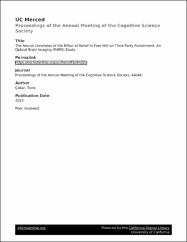Please use this identifier to cite or link to this item:
https://hdl.handle.net/20.500.11779/1786| Title: | The Neural Correlates of the Effect of Belief in Free Will on Third-Party Punishment: an Optical Brain Imaging (fnirs) Study | Authors: | Çakar, Tuna Akyürek, Güçlü Erözden, Ozan Şahin, Türkay Keskin, İrem Nur Ünlü, Meryem Özen, Deniz Hazal Özen, Zeynep |
Keywords: | ... | Publisher: | Cognitive Science Society | Source: | Cakar, T., Akyurek, G., Erözden, O., Şahin, T., Keskin, İ., Unlu, M., Özen, D.H., Ozen, Z. (July 27 – 30, 2022) The neural correlates of the effect of belief in free will on third-party punishment: An optical brain imaging (fNIRS) study. Proceedings of the Annual Meeting of the Cognitive Science Society. v. 44. pp. 1-9. | Abstract: | Third party punishment (TPP), or altruistic punishment, is specifically human prosocial behavior. TPP denotes the administration of a sanction to a transgressor by an individual that is not affected by the transgression. In some evolutionary accounts, TPP is considered crucial for the stability of cooperation and solidarity in larger groups formed by genetically unrelated individuals. Belief in free will (BFW), on the other hand, is the idea that humans have control over their behavior. BFW is a human universal notion that, in some studies, has been found to be supportive of prosocial behavior. In our study, we examined the effect of BFW on TPP under high and low affect scenarios through optical brain imaging (fNIRS). We hypothesized that in low affect cases, there would be a positive correlation between the strength of the BFW and the severity of the punishment inflicted. Obtained results and related statistical analyses indicate that participants with higher degree of BFW have more neural activation in their right dorsolateral prefrontal cortex (DLPFC) (hbo and hbt measures) in high affect scenarios, whereas the participants with lower degree of BFW have higher levels of neural activation in the medial PFC (hbo and hbt measures) in low affect scenarios. These empirical findings are in line with the research findings in the relevant academic literature and support the hypothesis that the degree of BFW influences punishment decisions. | URI: | https://escholarship.org/uc/item/95p9n32v https://hdl.handle.net/20.500.11779/1786 |
ISSN: | 1069-7977 |
| Appears in Collections: | Bilgisayar Mühendisliği Bölümü Koleksiyonu Hukuk Fakültesi Koleksiyonu |
Files in This Item:
| File | Description | Size | Format | |
|---|---|---|---|---|
| eScholarship UC item 95p9n32v.pdf | Full Text - Article | 524.1 kB | Adobe PDF |  View/Open |
CORE Recommender
Page view(s)
30
checked on Nov 18, 2024
Download(s)
10
checked on Nov 18, 2024
Google ScholarTM
Check
Items in GCRIS Repository are protected by copyright, with all rights reserved, unless otherwise indicated.